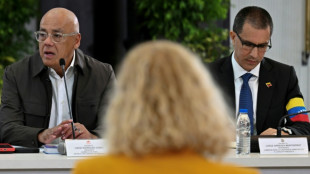
-
 NFL names 49ers to face Rams in Aussie regular-season debut
NFL names 49ers to face Rams in Aussie regular-season debut
-
Bielle-Biarrey sparkles as rampant France beat Ireland in Six Nations

-
 Flame arrives in Milan for Winter Olympics ceremony
Flame arrives in Milan for Winter Olympics ceremony
-
Olympic big air champion Su survives scare

-
 89 kidnapped Nigerian Christians released
89 kidnapped Nigerian Christians released
-
Cuba willing to talk to US, 'without pressure'

-
 Famine spreading in Sudan's Darfur, UN-backed experts warn
Famine spreading in Sudan's Darfur, UN-backed experts warn
-
2026 Winter Olympics flame arrives in Milan

-
 Congo-Brazzaville's veteran president declares re-election run
Congo-Brazzaville's veteran president declares re-election run
-
Olympic snowboard star Chloe Kim proud to represent 'diverse' USA

-
 Iran filmmaker Panahi fears Iranians' interests will be 'sacrificed' in US talks
Iran filmmaker Panahi fears Iranians' interests will be 'sacrificed' in US talks
-
Leicester at risk of relegation after six-point deduction

-
 Deadly storm sparks floods in Spain, raises calls to postpone Portugal vote
Deadly storm sparks floods in Spain, raises calls to postpone Portugal vote
-
Trump urges new nuclear treaty after Russia agreement ends

-
 'Burned in their houses': Nigerians recount horror of massacre
'Burned in their houses': Nigerians recount horror of massacre
-
Carney scraps Canada EV sales mandate, affirms auto sector's future is electric

-
 Emotional reunions, dashed hopes as Ukraine soldiers released
Emotional reunions, dashed hopes as Ukraine soldiers released
-
Bad Bunny promises to bring Puerto Rican culture to Super Bowl

-
 Venezuela amnesty bill excludes gross rights abuses under Chavez, Maduro
Venezuela amnesty bill excludes gross rights abuses under Chavez, Maduro
-
Lower pollution during Covid boosted methane: study

-
 Doping chiefs vow to look into Olympic ski jumping 'penis injection' claims
Doping chiefs vow to look into Olympic ski jumping 'penis injection' claims
-
England's Feyi-Waboso in injury scare ahead of Six Nations opener

-
 EU defends Spain after Telegram founder criticism
EU defends Spain after Telegram founder criticism
-
Novo Nordisk vows legal action to protect Wegovy pill

-
 Swiss rivalry is fun -- until Games start, says Odermatt
Swiss rivalry is fun -- until Games start, says Odermatt
-
Canadian snowboarder McMorris eyes slopestyle after crash at Olympics

-
 Deadly storm sparks floods in Spain, disrupts Portugal vote
Deadly storm sparks floods in Spain, disrupts Portugal vote
-
Ukrainian flag bearer proud to show his country is still standing

-
 Carney scraps Canada EV sales mandate
Carney scraps Canada EV sales mandate
-
Morocco says evacuated 140,000 people due to severe weather

-
 Spurs boss Frank says Romero outburst 'dealt with internally'
Spurs boss Frank says Romero outburst 'dealt with internally'
-
Giannis suitors make deals as NBA trade deadline nears

-
 Carrick stresses significance of Munich air disaster to Man Utd history
Carrick stresses significance of Munich air disaster to Man Utd history
-
Record January window for transfers despite drop in spending

-
 'Burned inside their houses': Nigerians recount horror of massacre
'Burned inside their houses': Nigerians recount horror of massacre
-
Iran, US prepare for Oman talks after deadly protest crackdown

-
 Winter Olympics opening ceremony nears as virus disrupts ice hockey
Winter Olympics opening ceremony nears as virus disrupts ice hockey
-
Mining giant Rio Tinto abandons Glencore merger bid

-
 Davos forum opens probe into CEO Brende's Epstein links
Davos forum opens probe into CEO Brende's Epstein links
-
ECB warns of stronger euro impact, holds rates

-
 Famine spreading in Sudan's Darfur, warn UN-backed experts
Famine spreading in Sudan's Darfur, warn UN-backed experts
-
Lights back on in eastern Cuba after widespread blackout

-
 Russia, US agree to resume military contacts at Ukraine talks
Russia, US agree to resume military contacts at Ukraine talks
-
Greece aims to cut queues at ancient sites with new portal

-
 No time frame to get Palmer in 'perfect' shape - Rosenior
No time frame to get Palmer in 'perfect' shape - Rosenior
-
Stocks fall as tech valuation fears stoke volatility

-
 US Olympic body backs LA28 leadership amid Wasserman scandal
US Olympic body backs LA28 leadership amid Wasserman scandal
-
Gnabry extends Bayern Munich deal until 2028

-
 England captain Stokes suffers facial injury after being hit by ball
England captain Stokes suffers facial injury after being hit by ball
-
Italy captain Lamaro amongst trio set for 50th caps against Scotland


Sydney's former HIV epicentre close to ending transmission
The inner-city area of Sydney, once the epicentre of Australia's HIV epidemic, is very close to becoming the first place in the world to reach the UN's target for ending transmission of the virus, researchers said on Monday.
UNAIDS has set a goal of ending AIDS as a global health threat by 2030, which includes reducing the number of new HIV cases by 90 percent compared to 2010.
In inner Sydney, new infections among gay men dropped by 88 percent from 2010 to 2022, researchers announced at the International AIDS Society's HIV science conference being held in the Australian city of Brisbane.
Andrew Grulich, an epidemiologist at the University of New South Wales who presented the research, told AFP that "we're very nearly there" some eight years ahead of the 2030 target.
Just 11 new HIV cases were recorded in inner Sydney last year, "an extraordinarily small number of infections for what was the heart of the Australian HIV epidemic," Grulich said.
Gay men make up an estimated 20 percent of the male population in inner Sydney, and they represent the large majority of the city's HIV cases.
Grulich said that several areas in the UK and Western Europe have also seen rapid drops in new HIV cases.
But "I don't think anywhere has gotten close to 90 percent," he added.
However Grulich emphasised that this does not mean that HIV is close to being eliminated in the city of more than 5.2 million people.
"HIV can only be eliminated if we have a vaccine and a cure," he said.
And the fall in new HIV cases was far less precipitous in other parts of Sydney.
In the city's outer suburbs, new cases have only fallen by 31 percent since 2010, the researchers found.
This disparity was due to a much higher rate of HIV testing and use of pre-exposure prophylaxis (PrEP) -- which reduces the risk of transmitting HIV during sex -- in the inner city, Grulich said.
He said another cause for progress was that around 95 percent of HIV-positive people in Australia are now on antiretroviral treatment, which suppresses the level of the virus in the blood.
Another study announced at the AIDS conference, which was published in The Lancet journal, said that people on antiretrovirals who have low but detectable levels of HIV have almost zero risk of sexually transmitting the virus to others.
- 'Beyond exciting' -
Sharon Lewin, the president of the International AIDS Society, said the progress in inner Sydney was "beyond exciting".
"It affirms that Australia is poised to be one of the first countries, if not the first, to achieve virtual elimination of HIV," she said in a statement.
Heather Ellis, a woman living with HIV in the southern state of Victoria, said that "the last mile" of eliminating HIV in Australia will require measures specifically designed to reach women.
While gay men are now well aware of prevention tools like PrEP, "the heterosexual community is pretty much oblivious," said Ellis, a communications coordinator for the NGO Positive Women Victoria.
The Sydney research, which has not been peer-reviewed, was based on data from the New South Wales health department as well as annual surveys taken by gay men.
Grulich said the progress in inner Sydney was particularly significant because "this was a community that was completely devastated in the 80s and 90s -- a few thousand men died in these areas".
N.AbuHussein--SF-PST



